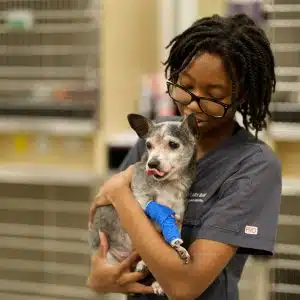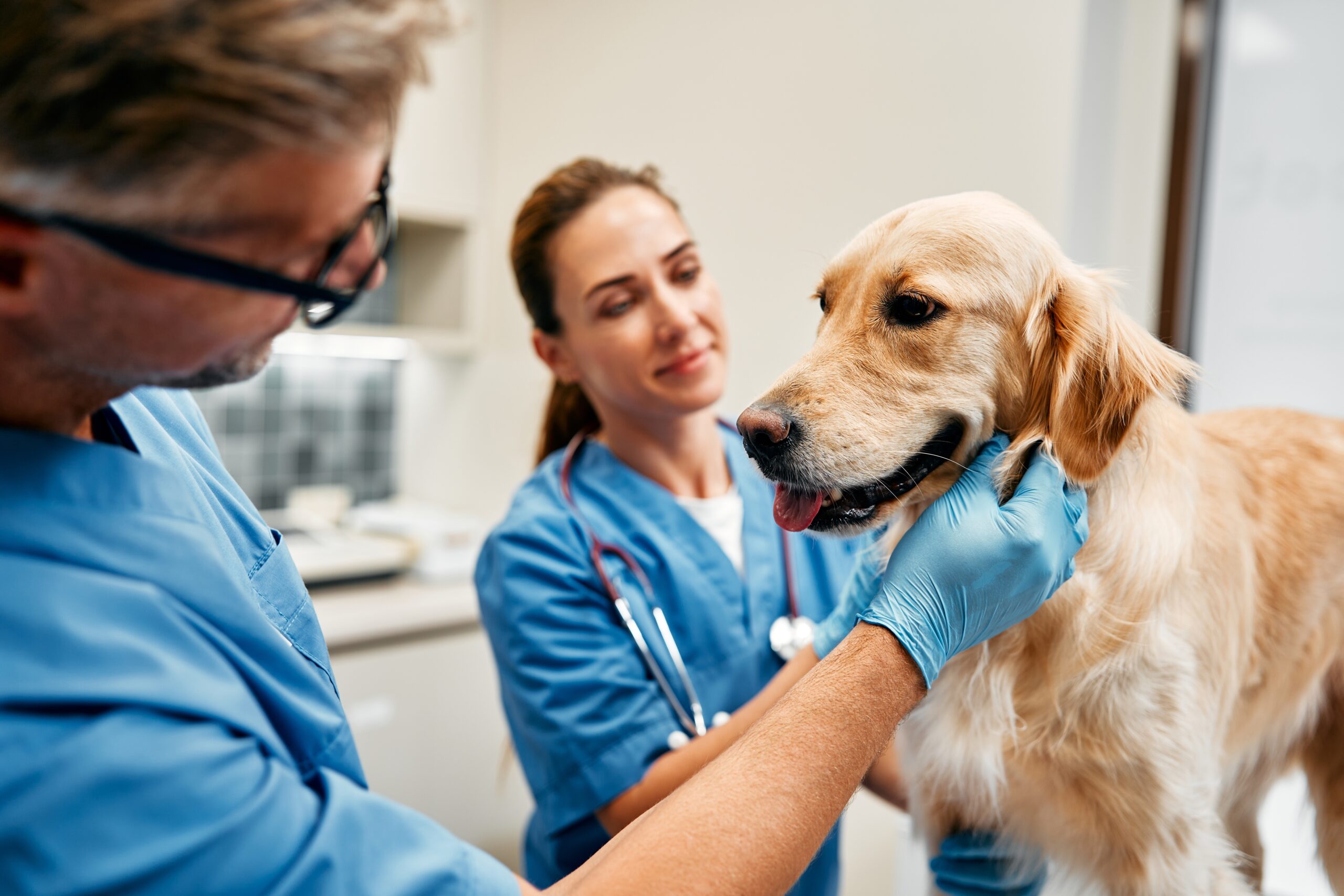Just How a Veterinary Oncologist Can Help Improve Your Pet's Lifestyle
Vet oncologists focus on the medical diagnosis and therapy of cancer in pet dogs, playing an important function in improving their lifestyle. They produce tailored therapy plans that address the one-of-a-kind demands of each animal. With innovative diagnostics and targeted therapies, these experts intend to take care of signs and symptoms effectively. Nonetheless, the journey does not end there. Checking out the full spectrum of treatment alternatives exposes even more concerning just how these experts can make a substantial difference.

Comprehending the Role of a Vet Oncologist

Along with diagnosis, vet oncologists develop thorough therapy methods tailored to the needs of each pet. These techniques might include radiation treatment, radiation therapy, and surgical treatments, targeted at not only prolonging survival but additionally improving the general lifestyle. In addition, they offer palliative treatment, concentrating on discomfort management and convenience for pets dealing with incurable diagnoses. By collaborating with animal proprietors, vet oncologists guarantee that family pets obtain the most effective and caring treatment feasible throughout their cancer journey.
Tailored Therapy Prepare For Your Pet
When an animal is detected with cancer cells, developing a tailored treatment strategy comes to be essential for addressing their special demands and conditions. A veterinary oncologist thoroughly examines the kind of cancer cells, its phase, and the total health and wellness of the family pet. This detailed assessment enables the creation of a personalized approach that may include a combination of surgery, chemotherapy, and radiation treatment.
The oncologist likewise thinks about the animal owner's preferences and lifestyle, making certain that the strategy lines up with their goals for their animal's care. Veterinary Oncologist. Therapy strategies are not static; they are routinely evaluated and adjusted based upon the family pet's reaction and any arising requirements. By focusing on individualized treatment, veterinary oncologists aim to boost the efficiency of treatments while keeping the family pet's lifestyle. This personalized strategy promotes a better understanding of the condition, equipping pet proprietors to make informed choices regarding their precious buddies' health
Handling Signs And Symptoms and Negative Effects
Taking care of the symptoms and adverse effects of cancer treatment is a vital component of veterinary oncology. Vet oncologists utilize a range of approaches to reduce discomfort and boost the overall wellness of family pets undergoing treatment. This may consist of the usage of anti-nausea medications to deal with throwing up and loss of appetite, which prevail adverse effects of chemotherapy. Discomfort management is also focused on, often including the prescription of analgesics tailored to the animal's certain demands.
Additionally, oncologists might advise nutritional adjustments, integrating top notch, conveniently absorbable foods to sustain dietary consumption. Monitoring blood work is important to discover any type of negative responses to therapy early, enabling for prompt treatments. Routine follow-ups allow the vet team to evaluate the animal's action to therapy and make required modifications. Through these extensive methods, veterinary oncologists aim to improve the lifestyle for pet dogs encountering cancer cells therapy difficulties.
Palliative Care and Convenience Actions
Palliative treatment plays a vital function in enhancing the lifestyle for pets detected with cancer cells, concentrating on comfort and psychological assistance instead of curative therapy. Vet oncologists prioritize discomfort administration, ensuring that pets experience marginal pain during their ailment. This consists of using analgesics, anti-nausea medicines, and other treatments tailored to individual demands.
In addition to medicinal treatments, environmental alterations can substantially enhance a pet's lifestyle. Producing a tranquility, comfy space with soft bed linen and easy accessibility to food and water can reduce stress and anxiety. Nutritional support is also necessary; oncologists may suggest specialized diet plans that accommodate the family pet's needs and choices.
Psychological support for both the pet dog and its owners is vital. Veterinary oncologists supply guidance on coping approaches, assisting family members navigate the emotional obstacles that accompany a cancer cells medical diagnosis. Ultimately, palliative treatment purposes to guarantee that family pets obtain the dignity and comfort they are entitled to.
Collaborating With Your Routine Vet
Cooperation with a regular veterinarian is crucial for optimizing the care of family pets with cancer cells, as this collaboration guarantees a complete strategy to treatment and lifestyle. The routine vet commonly has a comprehensive understanding of the animal's clinical background, which is essential when formulating a treatment plan. They can efficiently interact with the veterinary oncologist, making sure that all facets of the pet's health are thought about.
This partnership enables for collaborated treatment, which might consist of routine examinations, checking negative effects, and readjusting drugs as needed. Normal veterinarians can additionally offer psychological support to pet owners, aiding them browse the intricacies of cancer cells therapy - Pet Cancer Surgery. By working closely with vet oncologists, they can promote a seamless shift in between different kinds of care, making sure that animals get one of the most efficient link treatments while maintaining their convenience and health throughout the process. Together, they boost the overall lifestyle for animals facing cancer cells
Often Asked Questions

What Types of Cancers Do Veterinary Oncologists Usually Treat in Family Pets?
Vet oncologists generally treat various cancers in pets, consisting of lymphoma, pole cell lumps, osteosarcoma, and soft cells sarcomas. These professionals utilize sophisticated diagnostic methods and treatment options to address the specific demands of each pet.
Exactly How Can I Prepare My Family Pet for a Veterinary Oncology Appointment?
Preparing a pet for a vet oncology consultation from this source entails gathering clinical records, keeping in mind signs and symptoms, and preparing concerns. Guaranteeing the animal is comfortable and calm throughout traveling can likewise significantly enhance the total experience and examination effectiveness.
Exist Any Type Of Alternate Treatments for Family Pets With Cancer?
Alternative treatments for animals with cancer usually include acupuncture, herbal medication, and nutritional assistance. These methods may match conventional therapies, potentially boosting general well-being and supplying supportive treatment during the pet dog's cancer trip.
Exactly how Usually Should My Family Pet See the Veterinary Oncologist?
The frequency of brows through to a veterinary oncologist typically depends upon the pet's certain problem and treatment strategy. Normal evaluations might be recommended every couple of weeks or months to monitor development and readjust treatments appropriately.
What Costs Are Connected With Vet Oncology Services?
Expenses connected with veterinary oncology services can differ extensively, including preliminary appointments, diagnostic tests, therapy strategies, and ongoing care. Pet Cancer Surgery. Pet owners must plan for potential expenses that show the intricacy and period of the therapy required
Veterinary oncologists specialize in the diagnosis and treatment of cancer in family pets, playing a crucial role in improving their high quality of life. Several pet owners may not be familiar with the complexities of veterinary oncology, comprehending the duty of a vet oncologist is essential for managing cancer in animals. The oncologist likewise thinks about the family pet proprietor's preferences and way of life, making sure that the plan lines up with their goals for their animal's care. By focusing on individualized treatment, view publisher site vet oncologists intend to improve the efficiency of treatments while maintaining the animal's quality of life. By working very closely with vet oncologists, they can assist in a seamless shift between various kinds of care, guaranteeing that pets receive the most reliable therapies while preserving their comfort and well-being throughout the procedure.